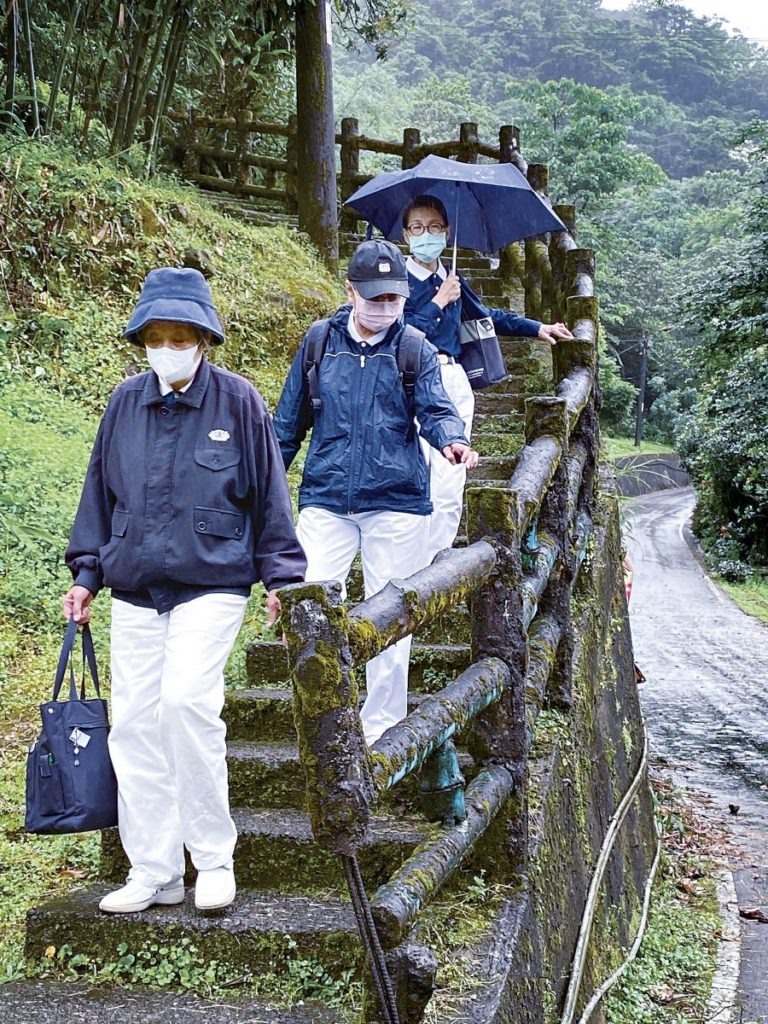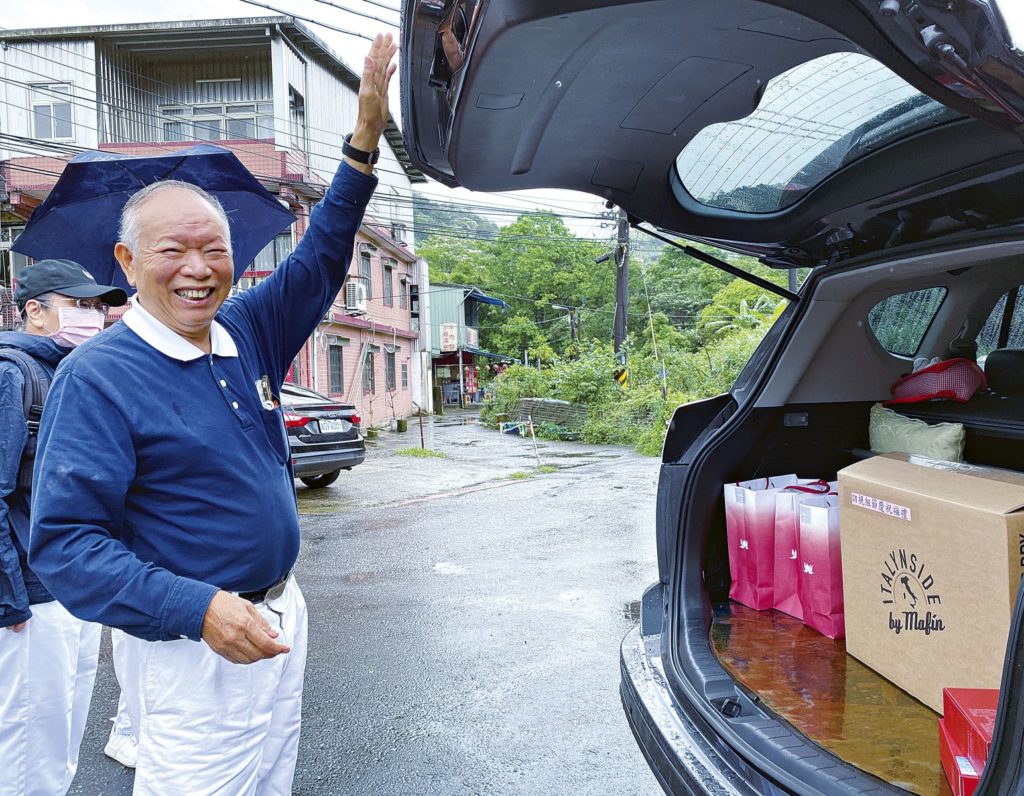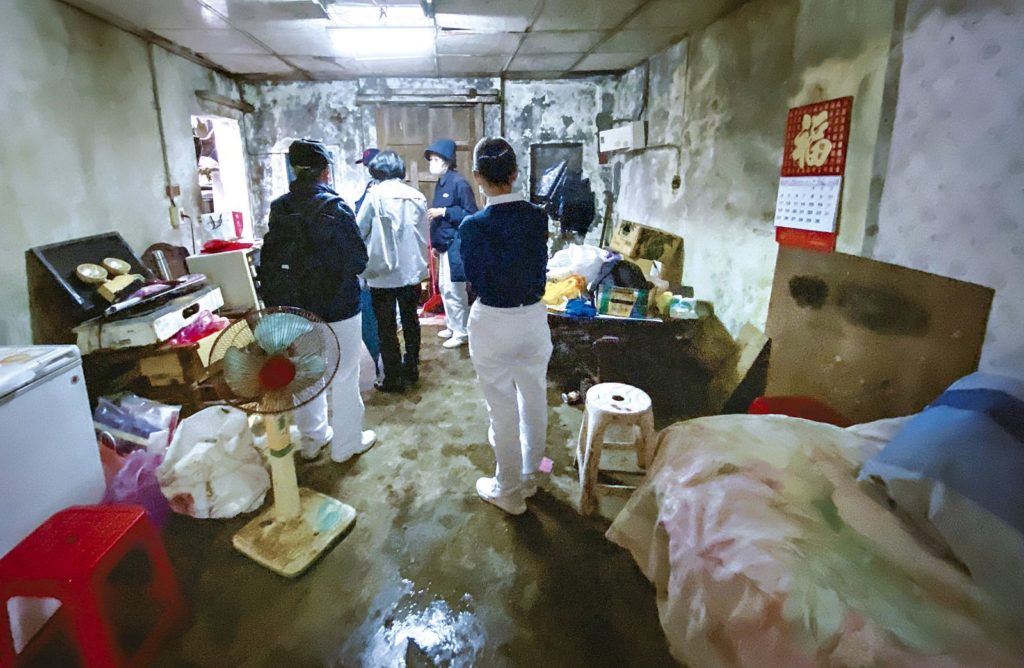Serving Families Through the Years
Text and photos by Zhu Xiu-lian (朱秀蓮)
Translated by Tang Yau-yang (湯耀洋)
Serving Families Through the Years
Text and photos by Zhu Xiu-lian (朱秀蓮)
Translated by Tang Yau-yang (湯耀洋)

Volunteers Chen Yue-e (left), Zhang Jin-an (middle), and Wang Mei-chun on their way to visit needy households in a mountainous area in New Taipei City.
"Hello there, we're here to see you. Are you happy?" Tzu Chi volunteer Zhang Jin-shi (張金時) called out to the old, bedridden woman. Zhang has checked on her once a month for more than ten years.
"Yes, yes. I'm very happy to see you!" the woman responded.
The two broke into an easy chat, just like old friends.
The elderly woman, a Tzu Chi care recipient, had been rushed to the hospital not too long before for emergency surgery due to an intestinal condition. She recalled that time to Zhang with lingering fears: "I could have lost my life if not for the protection of the bodhisattvas." She said she chanted the Buddha's name for a couple of hours every day. Zhang complimented her for her piety.
"We're about the same age," the woman continued, "but you're mobile, and I can only lie here. I really envy you."
The woman, 76, was just two years older than Zhang but had been bedridden for a long time. He tried to comfort her with words of encouragement. "Whatever happened has happened," Zhang said. "Let's try to think positively. Think of your good son. He takes good care of you!"
She was not the first care recipient suffering from a lingering illness that he and his fellow volunteers had visited that day. Some of the others were older than she, some younger. Whatever their age, Zhang's heart ached for all of them when he thought about them.
Meeting Their Needs
Heavy rains had started the night before, and had only tapered off a little by the morning of April 29, 2021. The rain was welcome at a time when almost the entire island of Taiwan was experiencing a severe drought. Despite the rain, Tzu Chi volunteers from Wenshan District, Taipei, were visiting needy families under the long-term care of the foundation in Pingxi and Shiding, New Taipei City. Though the rain caused traffic to be a little congested as they traveled through the busier urban areas, it only delayed them for about a quarter of an hour. Being a weekday, there were few tourists about in Pingxi and Shiding, so the streets were mostly clear for traffic there. Along the way, the snow-white flowers of tung trees were in full bloom on the hillsides, and some of the petals drifted down with the wind. It was quite a sight to behold. "We also get to see the sights along the way when we visit needy families nestled in the hills. It's kind of a jaunt, too," said volunteer Chen Yue-e (陳月娥).
"Charity work is the root of all Tzu Chi missions," she continued as the car traveled along the road. "If the needy can't come to us, we must go to them." Charity has always been an important mission of the foundation.
Chen explained that a potential case is always carefully assessed before it is accepted. This acceptance is followed by regular visits, often lasting years, before the case is closed. "Once a case is accepted, it remains open and active until the subject of the assistance has built a stable livelihood for himself or herself," Chen remarked.
Visiting the needy involves more than just showing up on a care recipient's doorstep. Associated tasks range from making phone calls, to setting up appointments, to recording what transpires during the visits. These are no easy tasks, but Chen does them cheerfully. She doesn't mind that new cases are regularly being added to her existing workload either. She's happy and grateful for the opportunities to give.
Chen is quick to express her gratitude for other volunteers, too. She is thankful to Lin Jun-chen (林峻辰) and Gao Bing-kun (高炳坤), who have always stepped up to the plate and done whatever needs to be done. And she is especially grateful to Zhang Jin-shi. "Since 2008," she said, "Brother Jin-shi has driven me and other volunteers to Pingxi and Shiding to visit the needy. It has been 13 years now. Given all that driving, scratches to his vehicles and flat tires have been unavoidable. He's paid for all the repairs, no matter the cost."
To drive more easily and safely on hilly terrain, Zhang Jin-shi replaced his old car with an SUV. Not long ago, he took the vehicle in for service. Its three-year-old tires were already worn out. He replaced all four tires without a second thought, notwithstanding the substantial cost. It's clear he cares more about the safety of the team than money.

Volunteer Zhang Jin-shi, 74, drives volunteers to mountainous areas in Shiding and Pingxi, New Taipei City, to care for disadvantaged families. He's been doing this for 13 years.
Because so much of Zhang's work involves driving in a mountainous area, he must know how to skillfully navigate the winding roads and occasional sharp turns of the thoroughfares. But the driving is even more challenging than that—some roads are so narrow that although he can drive to the home of a needy family, he may be unable to turn his vehicle around to drive out. In those instances, he has to back all the way out. That type of driving is far more difficult than passing the road test for a driver's license, but Zhang always breezes through it. "I've driven these roads for more than a decade," he says, which explains why he feels at home on the challenging roads. "Besides visiting underserved households here, I used to come here with other volunteers to collect recyclables."
Along the way, Zhang and Chen pointed out houses they had visited before. Some of the households were able to get back on their feet, so they no longer needed Tzu Chi's help. Other care recipients had passed away. Nothing is forever—change and impermanence are the eternal truth of the universe.
The Vicious Cycle of Illness and Poverty
"Watch out, these steps are slippery!" one volunteer called out, cautioning the others to tread carefully. Quaint, almost ancient-looking, the steps leading to a house the volunteers were visiting were covered with moss. Chen Yue-e and her fellow volunteers Zhang Jin-an (張謹安) and Wang Mei-chun (王美春) carefully negotiated the steps. A dog barked non-stop at the approaching visitors, but the volunteers commented that the dog really wasn't as fierce as it sounded. In contrast, they had visited homes guarded by dogs so threatening that they had to honk their horns to alert the hosts to securely chain up the dogs before they dared to get out of the car.
The volunteers were visiting a former aid recipient whose mother had just passed away. "She looked fine just before the Chinese New Year holiday," one of the volunteers said. "This was so unexpected." The aid recipient was receiving a low-income subsidy from the New Taipei City Government, so Tzu Chi decided to cease its aid to this family, but now they were faced with this new development. The aid recipient said that her mother had fortunately not suffered much before she died. "She didn't want to burden us," she said. The volunteers offered her some money and asked her to sign for it. They reminded her to use the money wisely.
Most members of the family were mentally challenged, and relied on government assistance and odd jobs to get by. The children's grandfather had built their house and it still remained sturdy, so the family had at least been able to live decently. Their father, 60ish, looked older than his age. He even looked older than the visiting volunteers who were older than he was. The volunteers urged him to take advantage of the nice natural setting around his home to boost his own health by, for example, taking walks on nice days.
The group next visited the home of a prospective aid recipient whose house needed repairing. A local health official drove ahead of the volunteers, leading the way to the household. When they arrived, the volunteers were a bit befuddled: the house looked good and didn't appear to be in disrepair. But the official passed that home and led the group further into a large galvanized metal building. Stuff was piled up everywhere inside, but the place didn't look like it needed repair either. Walking further inside, they came to a stuck door on which hung an official address plate—an indication of a legal address. It turned out that it was a home within another home. "No wonder I couldn't find this address with GPS!" Zhang Jin-shi exclaimed.
"How could anyone live in this?!" Pushing open a side door, the volunteers saw a small wooden hut with a broken roof. The rickety structure appeared ready to collapse at any time. It was a scary sight.
The official called out the name of the person they had come to see, but there was no answer. "He might be at the community nursing center," the official offered. Chen Yue-e asked him to lead the group to the nursing center, where they soon found the man. He was partially deaf, so people needed to speak directly into his ears. After they had talked for a while, the volunteers and the official began to urge the man to move into the social welfare center where the official had arranged residence for him. He had no legal ownership to the rickety "home within a home," and it was uninhabitable anyway. The man's neighbors that were around joined in to persuade him. They pointed out to him that the social welfare center would provide him with room and board and so he wouldn't have to worry any more about how to get by. The man eventually nodded his consent to the new arrangement. Everyone heaved a sigh of relief.
The volunteers' next stop was the home of a centenarian woman. She greeted everyone warmly and apologized for not having chairs for everyone. The sight of her lying in bed saddened the volunteers. She used to be up and about and would sing for the volunteers, but had become bedridden about two months before. All she could do was lie there and listen to the radio. She spent her days at home alone when her relatives living nearby went to work. They could only come to feed her when they got off work.
The volunteers visited 13 households that day. Mother's Day was approaching so they gave out Mother's Day presents. Families with cancer or recuperating patients received additional gifts of multi-grain powder and noodles. A few of the families had more than one patient to care for. "When it rains, it pours" was not just an abstract proverb for these families, but a very real situation. Some people become poor because of illness while others become ill due to poverty, but regardless of which leads to which, they all end up poor and sick. There are many such families in the dark corners of society who are in dire need of help.
Fortunately, the picture is not all grim. The volunteers visited a family that day in which the mother had fallen ill but the child had worked hard nonetheless and earned admission to a very good high school. That took a big load off his father's shoulders. Another family had received assistance from the district government office to fix their roof and had thus been able to get their lives back on track. The family's home was so clean it sparkled. Events like this were uplifting for the volunteers.
In the process of visiting underprivileged families, Tzu Chi volunteers have come to realize that many more social welfare organizations are caring for the needy in society, especially the elderly. That's something in which they take comfort. However, they also know that their workload will only increase with Taiwan's rapidly aging population. "That's why we won't reduce the ranks of our home visit volunteers," Chen Yue-e said.
Dharma Master Cheng Yen has always instructed home visit volunteers to put themselves in the shoes of the underprivileged when they conduct their visits. Chen and her fellow volunteers keep those words firmly in mind. Whatever the weather and wherever care recipients may live, Chen and the rest of the team keep up the visits, month after month, year after year, because "that's the duty of Tzu Chi volunteers," she said.
Tzu Chi volunteers deliver love, warmth, and hope to those in need—not only in Taiwan, but in many other places in the world. They welcome the participation of more like-minded people. Everyone has a role to play to make the world a better place.

Led by a local official, volunteers visit the home of a prospective aid recipient to assess his needs for help.
Contact Us | Plan a Visit | Donate
8 Lide Road, Beitou 11259, Taipei, Taiwan
886-2-2898-9999
005741@daaitv.com
©Tzu Chi Culture and Communication Foundation
All rights reserved.
